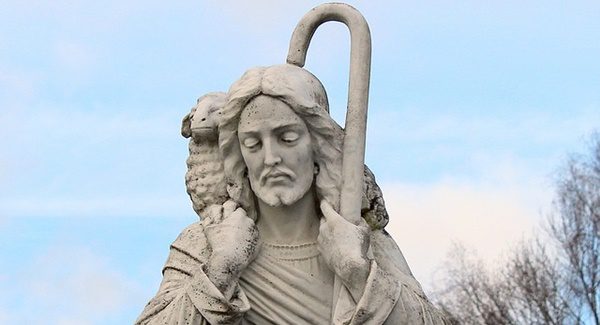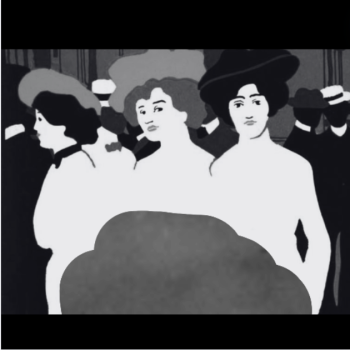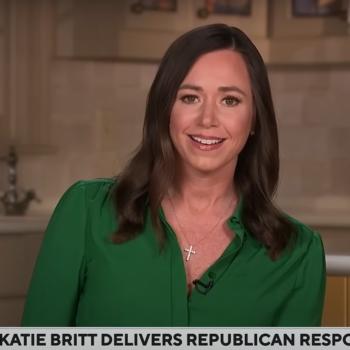The following is a sermon I preached at Clackamas United Church of Christ, near Portland, Oregon. The text was Psalm 23 and John 10:11-18. The video recording of the sermon is below, along with the text.
Today happens to be Earth Day. According to Christian tradition, it also happens to be Good Shepherd Sunday. On Good Shepherd Sunday we celebrate that Jesus is our shepherd. But this causes a bit of a problem, because if Jesus is our shepherd then that makes us his …
At Bible Study this last week, I asked the group how they felt about being sheep. And I want to share with you the brilliance of your church. One person said that it made her feel “sheepish.”
Oh but the brilliance did not end there because then another person said it made her feel, “baaad.”
There are all kinds of negative connotations to being called a “sheep.” Many of you know that I have a blog and I’m on social media. One of the biggest insults going around the internet right now is to combine the word “sheep” and “people” to call your opponents “sheeple.”
There’s an irony in the fact that on social media, where the point is to follow certain people, the worst thing you can be is a follower.
But it goes beyond social media. It’s as if the worst thing you could be in this world is a sheeple.
That’s because the modern world tells us that we need to be individuals. Two of the most important messages of the modern world is “Think for yourself!” and “Be your own man or woman!”
And there’s something important about our individuality. The modern emphasis on the individual has helped foster a sense of human rights and has created some protection for the individual from the crowd. But the modern emphasis on individuals has created a problem. And that problem is called individualism.
The individualism of the modern world often pits the individual against the community. With individualism comes a sense that communities and institutions are always evil and cannot be trusted. So we end up living in isolation.
But individualism doesn’t just pit individuals against the community. It also pits individuals against one another. When we emphasize the individual, we start comparing our individual qualities against one another, which creates adversarial relationships.
We do this in many different ways. How do we know if we are beautiful? We compare ourselves with someone we think isn’t. How do we know if we are successful? We compare ourselves with someone we think is a failure. And this is the most dangerous one I think: How do we know that we are good? Well, we all want to be good people, and the way we knew we are good is to compare ourselves with other who we think are bad.
I’ll give you a personal example. My son decided he wanted to take taekwondo lessons. So I took him to his lessons and sat with the parents on benches as we watched our children. Well, after a month, he asked me if I would take the class with him. I was a little worried about what the other parents would think of a 39 year old kicking and punching their 8 year old. It’s a little awkward. But I signed up anyway.
Yesterday, my wife asked me about the class and I said, “You know, I don’t understand why those other parents don’t take the class with their children. It’s good bonding time with them, and those parents are just sitting there. Why don’t they take the class and work towards something with their kids?”
She looked me in the eyes and said, “That was judgmental.”
And she was exactly right. I projected my own insecurities about taking the class upon the other parents, and then I became judgmental towards them. That judgment against them gave me a very dangerous sense of superiority in opposition to them.
I don’t know about you, but I frequently fall into this trap of comparing myself with others in order to make myself feel like I’m better than them. And it’s actually very dangerous to our spirituality because it fosters a sense of opposition. You cannot love your neighbor if you feel you are morally superior to them.
And this leads me back to the Good Shepherd and the art of being sheep. You never see individual sheep comparing themselves with other sheep. Sheep don’t think to themselves, “My wool is fluffier than their wool.” Or, “That sheep is a darker color.” Or, “That sheep over there is so lazy, unlike me! I work much harder!” Sheep don’t create a hierarchy of individualism or a sense of goodness by comparing themselves against each other.
I think that’s part of what Jesus meant by calling his disciples sheep. It wasn’t that they were to be mindless followers. In fact, sheep aren’t stupid. Did you know that sheep can remember 50 individual faces for up to 2 years? I can’t remember anyone’s face after two hours.
Jesus emphasized sheep because sheep live in a community that doesn’t make distinctions of value among themselves. The time of comparing ourselves against others in terms of worth or goodness is over. In that sense, we are to be like sheep. We’re all on the same level.
We know this because Jesus calls himself the Good Shepherd. And what did Jesus mean by calling himself the Good Shepherd? Well, he didn’t mean that he’s “good” in a moralistic sense. That is, he’s not good because he’s better than or superior to all of us. Rather, he says in our passage that he’s the Good Shepherd because he cares for his sheep. He loves his sheep. All of them. He doesn’t make distinctions between good sheep and bad sheep. He loves all sheep. He even has sheep that are not of this fold. And he loves them, too.
Jesus doesn’t exclude those whom we label as “other” sheep. That’s what we do. It’s not what Jesus does. Jesus the Good Shepherd loves the gay sheep, the transgender sheep, the bisexual sheep, the conservative sheep, the liberal sheep, the soldier sheep, the police sheep, the hippie sheep, the black sheep, the brown sheep. He makes no distinction between sheep. He loves them all and calls us to love them all, too.
Here’s the other thing about the Good Shepherd. In Jesus’ first century world, nobody wanted to be a shepherd. In fact, shepherds were usually social outcasts. It was difficult and disgusting work. Shepherds always smelled like their sheep. In fact, shepherds had to be one with their sheep. They had to get down in the mud and dirt to care for their sheep. Shepherds were always filthy and stinky, just like their sheep.
Jesus was the Good Shepherd because he got filthy and dirty. He got down in the mud and muck with us. He’s not a shepherd who stands off in the distance proclaiming his individual goodness in opposition to his sheep. No, the Good Shepherd is one with his sheep. He’s the Good Shepherd because he laid down his life for his sheep because he loved and cared for his sheep.
Which leads me to my final point and hopefully a connection to Earth Day. Left to their own devices, sheep will destroy the land. So shepherds have to create structures and systems to preserve the land. One way they do that is to rotate the sheep among two or three pastures in order to let the land rest.
Like sheep, we are witnessing the fact that left to our own devices, we will destroy the land, too. In fact, we are destroying the land. Tigers and many other animals are endangered species because of poaching and habitat loss from human activity. But we can take it to another level: Global warming makes all life on earth an endangered species.
How did we get to this point? I think it’s because we’ve moved away from Jesus the Good Shepherd, who loves and cares for everyone and, indeed, all of creation. And Jesus fulfills Psalm 23, where the Lord is my shepherd and even though I walk through the valley of the shadow of death, I will fear no evil, for Jesus is with me.
Yes, there is evil in the world. But Jesus is our Good Shepherd and we are his sheep whom he loves. When it comes to God’s love, God makes no distinctions. God loves all people, all of creation, and invites us to love all of creation, too.
Friends, Jesus, our Good Shepherd. He knows what it’s like to get his hands dirty as he works for justice. And he is with us as we get our hands dirty. He’s the shepherd who is one with his sheep and who walks with us in the valley of the shadows of death. We know that the wolves came after Jesus. And in our work for more justice and love, the wolves may come after us, too. But as we work for a better world, we don’t need to fear the evil that may come against. For our Good Shepherd walks with us. And we his sheep walk with one another. May we know this deep in our bones. Amen.
Image: Pixaby.
Stay in the loop! Like Teaching Nonviolent Atonement on Facebook!















